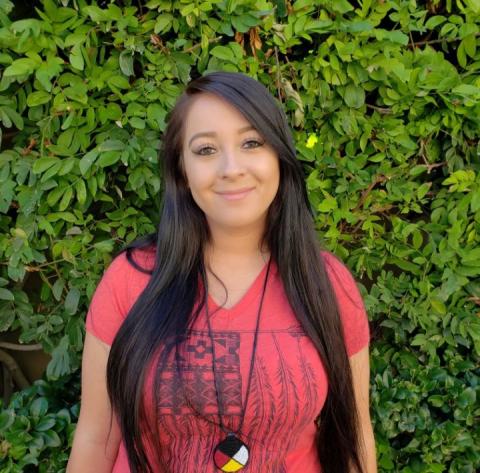After a highly successful academic career at California State University, San Marcos (CSUSM), Rachelle Peterson found a graduate program that could deliver what she wanted. With an ultimate career goal of working as a school psychologist serving the Native American population, this member of the Soboba Band of Luiseño Indians found what she needed at San Diego State University (SDSU).
Peterson is enrolled in the School Psychology (Ed.S.) program and is also a scholar on the SHPA grant for the upcoming school year. SHPA stands for Supporting High-Intensity Mental Health Needs of Native and Indigenous Youth: School Psychologist and Counselor Advanced Preparation.
SDSU’s School Psychology Program prepares school psychologists to be systems change agents in culturally diverse schools. It embraces an ecosystemic philosophy-orientation and emphasizes multicultural content, processes and experiences. The program provides an integrated sequence of theory, research and practice in seven areas over a three-year sequence of full-time study, followed by a full-time, year-long internship. This integrated graduate-profession program culminates in the Educational Specialist (Ed.S.) degree in School Psychology.
“During my last year as an undergrad, Geneva Lofton-Fitzsimmons, CSUSM’s President’s Native American Council Board (NAC) and student program coordinator for NARCH, informed me about the program and helped me get into contact,” Peterson said. “She has offered so much support and guidance to not only myself but many other Native students. I decided on SDSU because of the advanced preparation the program has to offer and the SHPA grant which focuses on mental health needs of Native and Indigenous youth.”
Peterson was the first-ever graduate from CSUSM’s American Indian Studies bachelor’s degree program in 2019. As a member of the campus’ American Indian Student Alliance (AISA), she was given a platform to reach a bigger and new population of people that could be educated on issues surrounding Indian Country. She served as Chair at AISA for the last two years at the college.
“Without the continued encouragement, support and guidance of Dr. John W. Tippeconnic III and Dr. Stanley Rodriguez I would not have pursued my master’s degree,” she said. “Throughout my educational journey they have been my mentors and role models teaching me the power of education. I am so grateful to have such strong Native leaders to show me the way.”
Peterson began a six-week long summer course on July 7 and will start fall semester classes on August 24. SDSU has given permission for the program to allow some in-person classes but it may change as protocols surrounding the COVID-19 pandemic change. Currently, she is scheduled to attend four of her seven classes on the campus and three others online.
“I am very excited for the near future and the many opportunities it will bring,” she said. “School is never easy. It can be difficult trying to balance work, family, friends and school all at once.”
Peterson said that while she is on the SHPA grant, she will have the opportunity to work with other Native students in the same program and the school counseling program.
“SHPA allows Native students to have our own community within the program to support and connect with each other,” she said. “SDSU also has a student organization on campus known as the Native American Student Alliance (NASA).”
Prior to starting this next chapter of her academic journey, Peterson worked at Riverside-San Bernardino County Indian Health, Inc. as part of its Native Challenge program, which serves youth and families through health education programming.
“Working at Native Challenge gave me a stronger perspective on issues within the educational institution, specifically regarding the Native student population,” she said. “The work we did with these students made me realize the need for mental health professionals for Native youth.”
School psychologists are dynamic educators that work within school settings in order to help diverse students succeed academically, socially, behaviorally and emotionally. They collaborate across school, home and community to facilitate positive educational change. They are change agents within the schools, serving multicultural and diverse populations and striving to ensure that every student receives an equitable education.
“I hope to give back to my tribe and Native community in the future by working at Noli Indian School and Sherman Indian High School,” Peterson said.
She is always willing to draw on her own experiences and share advice to young students, especially Native youths.
“If you are unsure about attending college go anyway whether it is a university, a trade school or community college,” Peterson said. “Invest in yourself – not for just you but for the generations that follow because they need you to be the change.”
Photo courtesy of Rachelle Peterson


